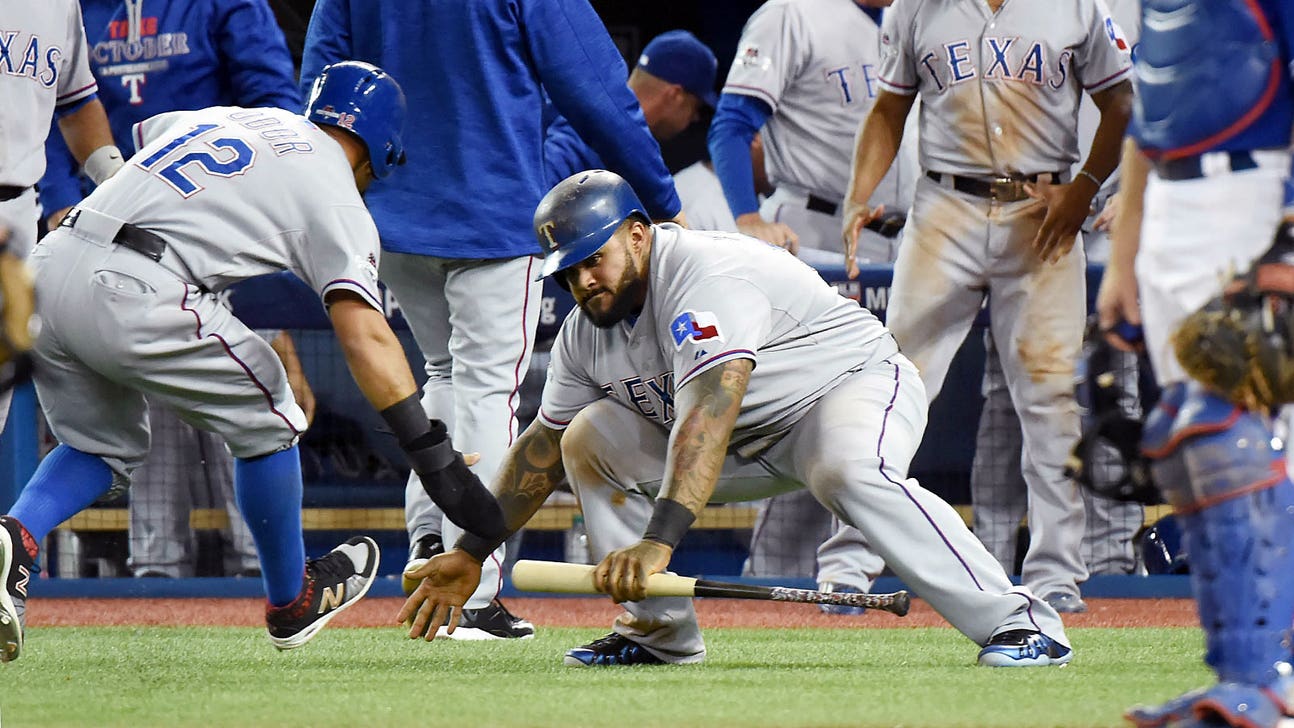
October Moment: When something wildly rare happens
It’s still early in this championship tournament, but it’s hard to imagine that we’ll see anything more controversial than what happened Wednesday in the top of the seventh inning in Game 5 of the Blue Jays' 6-3 win over the visiting Rangers. Even though the entire affair wound up being mooted by the Rangers’ three errors and Jose Bautista’s tiebreaking three-run homer in the bottom of the seventh.
In case you missed it, or have already forgotten — the bottom of the seventh tends to fill the memory cells — the score was 2-2 after six innings.
Texas’s Rougned Odor led off the seventh with a single, and advanced to third base on a sacrifice and a groundout. With Shin-Soo Choo up, Aaron Sanchez’s fourth pitch was a ball, making the count 2 and 2. But before Sanchez could throw another pitch to Choo, this wildly rare thing happened:
The operable rule here seems to be 6.03(a)(3) ... which, bizarrely enough, seems to exist in two forms: the form in the official rules on Major League Baseball’s official website, rules just revised and newly codified in 2015; and the form that was handed out in the press box Wednesday, which apparently supersedes whatever might be on the Internet.
Where this press-box version comes from, one can only guess. But it’s highly specific and highly applicable to this particular case:
If the batter interferes with the catcher’s throw to retire a runner by stepping out of the batter’s box, interference shall be called on the batter ...
However, if the batter is standing in the batter’s box and he or his bat is struck by the catcher’s throw back to the pitcher (or throw in attempting to retire a runner) and, in the umpire’s judgment, there is no intent on the part of the batter to interfere with the throw, the ball is alive and in play.
Considering how specific that clause is, and how perfectly it matches what everyone actually saw on the field, the Blue Jays’ only plausible remaining avenue of complaint, if they’d followed through with their official protest, would have been umpire Dale Scott’s actions. As you can see, well before Odor crossed the plate, Scott was waving his arms, presumably declaring dead ball, whether because of interference or something else.
Scott’s actions were problematic. When an umpire waves his arms for timeout, whatever happens next doesn’t count. But there are situations when an umpire waves his arms and what happens next does count. When a pitcher balks, but still delivers a pitch, the balk is ignored if the batter reaches base and every other runner advances at least one base.
Ultimately, it comes down to this: THE UMPIRES GOT THE CALL RIGHT. Sure, it took 18 minutes and a couple of calls to New York, but they got it right. Russell Martin made a weirdly terrible, terribly weird error, for which the Rangers deserved to score a run and take the lead. Which they did. You can criticize the rules for being unclear, and you can criticize Scott for reacting poorly to something he’s probably never seen before. But still the umps got it right, somehow.
Then a bunch of fans threw crap on the field and the Rangers made a bunch of fielding mistakes and Sam Dyson threw a fat pitch to Bautista and other things got thrown on the field and the benches cleared and everybody settled down and the Blue Jays won their third straight game and they’re hosting a couple games in the American League Championship Series in a couple of days and it’ll be a real upset if we ever see anything like this again this month. Or, ever.










